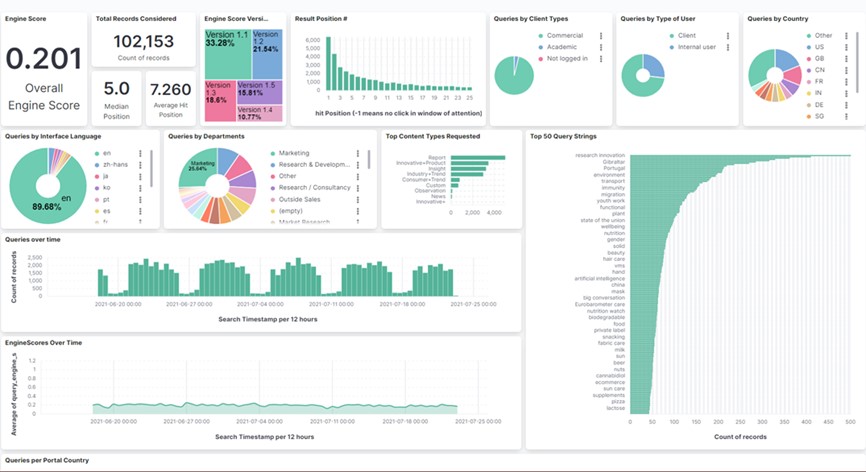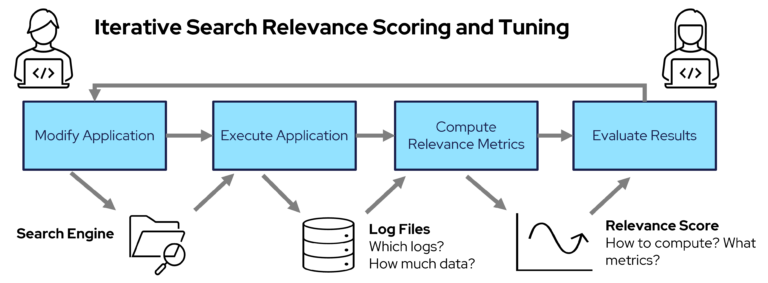

Martin Bayton
You can’t improve what you can’t measure.
In today’s digital world, ecommerce has become a dominant force in retail. With consumers increasingly relying on online shopping for their purchasing needs, businesses are constantly striving to enhance their ecommerce platforms to deliver a seamless and personalized shopping experience. One crucial aspect of this optimization process is the implementation of a robust and intelligent site search. And measuring and improving ecommerce site search has become a business-critical function.
Ecommerce site search is a critical component of online shopping experiences, as it helps users quickly find the products they are looking for, delivering tangible benefits such as improved conversion rates and incremental revenue. Performance is generally measured by the relevancy of search results, so ecommerce companies, quite rightly, invest a lot of time and effort in improving relevancy.
But there’s a conundrum, how do you measure search performance and if you tune the engine how do you know if your adjustments are having a positive impact? In this blog, we will explore how the Pureinsights Search Relevancy Scoring Dashboard can help answer those questions.
What is search engine scoring?
In practice, most methodologies for evaluating search accuracy are subjective – influenced by personal feelings, tastes, or opinions – and implemented ad-hoc. It is now recognized that quality search relevancy can only be achieved via a continuous improvement process that incorporates an objective and scientifically valid method of determining search accuracy metrics. Those metrics can then be used with confidence to improve search relevancy in a controlled and measurable way. The Search Relevancy Scoring Dashboard provides the diagnostic capabilities required to support this process. Essentially it is a diagnostic application used to objectively measure the quality or ‘score’ of a search engine at any given time and assist search engineers with relevancy tuning. Allowing them to continuously improve search performance.
How the Search Relevancy Scoring Dashboard is used in practice
The following steps form the basis of how the Search Relevancy Scoring Dashboard can be used to support the measurement and continuous improvement of an ecommerce site search engine to ensure that it is always performing to the best of its ability.
Gather historical data: audit and process log files such as query logs, click logs and others indicative of user activity, there is a treasure of insight in these files. Plus, consistent use of the same data in simulations helps ensure valid conclusions about whether you are really improving results or not.
Analyse: use the Search Relevancy Scoring Dashboard to analyse log file data and calculate a normalized engine score to get a baseline for the quality and relevance of current search application results. The Dashboard is a powerful analytical tool and can be used to discover patterns, behaviour and relationships that will inform relevancy tuning decisions. It can show performance for the search system as a whole or any other important metric such as category, region, or product. One striking feature is its ability to extract insights from data in near real-time so timely tuning adjustments can be made.


Engine Tuning: the process of fine-tuning the configuration, settings, and parameters of an ecommerce site search engine to optimise its performance and deliver the best possible search experience for customers. To make sure you understand the impact of each change, you must lay out a plan or set of ‘experiments’ on the incremental improvements. Then use the diagnostic capabilities of the Dashboard to iterate through your different tuning experiments and calculate normalized engine scores. If you see significant improvements at any given step, you may decide to deploy those changes into production even before you finish all your tests.
Testing: Perform A/B testing to validate improvements. Implement a continuous improvement process.


The importance of search relevancy and engine scoring in ecommerce
So, what are the outcomes of using an application like the Search Relevancy Scoring Dashboard in our efforts to tune and improve search engine performance? Here are some examples:
Improved Search Relevance: The success of any ecommerce site depends on how accurately it can understand and meet the needs of its users. Using the Search Relevancy Scoring Dashboard, search engineers can analyse user queries, search behaviour, and product attributes to deliver highly relevant search results. This ensures that users find what they are looking for quickly and easily, leading to increased customer satisfaction and higher conversion rates.
Personalization: Today’s consumers expect personalized experiences from online retailers. The Search Relevancy Scoring Dashboard enables ecommerce businesses to leverage user data and preferences to personalize search results. By understanding user behaviour and preferences, ecommerce businesses can deliver tailored search results that align with individual user preferences, browsing history, and purchase history. This personalization not only enhances the user experience but also helps drive customer loyalty and repeat purchases.
Business Rules and Promotion: Analysis using the Search Relevancy Scoring Dashboard can provide insights that will help ecommerce businesses to define and apply their own business rules and promotion strategies to search results. For example, businesses can prioritize certain products or brands, promote specific items or offers, or apply pricing or inventory rules. This gives them the flexibility to promote products or offers strategically, optimizing sales and revenue.
Enhanced Merchandising: Merchandising plays a critical role in driving sales for ecommerce businesses. Insights from the Search Relevancy Scoring Dashboard help ecommerce businesses to optimize product placement and presentation in search results. By leveraging product attributes such as popularity, ratings, and reviews, businesses can prioritize products that are most likely to convert and ensure that they are prominently displayed in search results. This can help drive higher click-through rates and conversion rates, ultimately resulting in increased sales.
Continuous Search Improvement: The engine scoring capabilities of the Search Relevancy Scoring Dashboard are a vital component of a continuous search improvement process enabling search engineers to continuously monitor, measure and refine search results. By analysing search queries, user behaviour, and product data, businesses can identify patterns and trends, and make data-driven decisions to optimize search results. This helps in continuously improving the search experience and ensuring that users receive the most relevant and accurate results.
Summary: Measuring and improving Ecommerce Search is Business Critical
In today’s competitive ecommerce landscape, delivering a superior search experience is crucial for driving customer satisfaction, loyalty, and revenue. The Search Relevancy Scoring Dashboard with its engine scoring and diagnostic capabilities plays a pivotal role in achieving this by supporting search engineers in their quest to deliver relevant and personalized search results that meet the needs of users. It enables ecommerce businesses to leverage user data, apply business rules and promotions, optimize merchandising, and continuously improve search results. By implementing an intelligent and robust search engine scoring system, ecommerce businesses can unlock the power of search to drive customer engagement, conversions, and business growth.